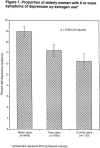Postmenopausal estrogen therapy and depressive symptoms in older women
- PMID: 10940144
- PMCID: PMC1495584
- DOI: 10.1046/j.1525-1497.2000.04029.x
Postmenopausal estrogen therapy and depressive symptoms in older women
Abstract
Background: Evidence regarding the effect of postmenopausal estrogen therapy on mood is limited.
Methods: To determine whether postmenopausal estrogen therapy is associated with fewer depressive symptoms in elderly women, we conducted a cross-sectional study of 6, 602 white women ages 71 years or older who were recruited from population-based listings in Baltimore, Md; Minneapolis, Minn; Portland, Ore; and the Monongahela Valley, Pa. Use of estrogen and progestin was determined by interview. Participants completed the Geriatric Depression Scale short form (GDS) and were considered depressed if they reported 6 or more of 15 possible symptoms of depression.
Results: A total of 6.3% (72/1,150) of current estrogen users, 7.2% (142/1,964) of past estrogen users, and 9.0% (313/3,488) of never users reported 6 or more symptoms of depression (P =.004). Current estrogen users had a decreased risk of reporting 6 or more depressive symptoms, compared with not current (past or never) users of estrogen (odds ratio [OR], 0.7; 95% CI, 0.5 to 0.9; P =.01], adjusted for living alone, bilateral oophorectomy, current smoking, physical activity, social network, self-perceived health, cognitive function, functional status, and antidepressant use. However, excluding women who use estrogen or progestin alone, we were unable to find an association between current use of combined estrogen plus progestin therapy and depressive symptoms (adjusted OR, 0.8; 95% CI, 0.5 to 1.4; P =.5).
Conclusions: This cross-sectional study found that current use of unopposed estrogen was associated with a decreased risk of depressive symptoms in older women. Additional studies are needed to understand the effect of combined estrogen and progestin therapy on the prevalence of depressive symptoms in older women.
Figures
Similar articles
-
Estrogen replacement therapy and fractures in older women. Study of Osteoporotic Fractures Research Group.Ann Intern Med. 1995 Jan 1;122(1):9-16. doi: 10.7326/0003-4819-122-1-199501010-00002. Ann Intern Med. 1995. PMID: 7985914
-
Postmenopausal estrogen and estrogen-progestin use and 2-year rate of cognitive change in a cohort of older Japanese American women: The Kame Project.Arch Intern Med. 2000 Jun 12;160(11):1641-9. doi: 10.1001/archinte.160.11.1641. Arch Intern Med. 2000. PMID: 10847257
-
Association between depressive symptoms and mortality in older women. Study of Osteoporotic Fractures Research Group.Arch Intern Med. 1998 Oct 26;158(19):2129-35. doi: 10.1001/archinte.158.19.2129. Arch Intern Med. 1998. PMID: 9801180
-
Systematic review and meta-analysis of the effects of progestins on depression in post-menopausal women: An evaluation of randomized clinical studies that used validated questionnaires.Maturitas. 2024 Nov;189:108105. doi: 10.1016/j.maturitas.2024.108105. Epub 2024 Aug 28. Maturitas. 2024. PMID: 39226622
-
Breast cancer risk with postmenopausal hormonal treatment.Hum Reprod Update. 2005 Nov-Dec;11(6):545-60. doi: 10.1093/humupd/dmi028. Epub 2005 Sep 8. Hum Reprod Update. 2005. PMID: 16150813 Review.
Cited by
-
Elevated plasma oxytocin levels and higher satisfaction with life in young oral contraceptive users.Sci Rep. 2020 May 19;10(1):8208. doi: 10.1038/s41598-020-64528-w. Sci Rep. 2020. PMID: 32427955 Free PMC article.
-
Changes in elderly women's health-related quality of life following discontinuation of hormone replacement therapy.BMC Womens Health. 2005 May 16;5:7. doi: 10.1186/1472-6874-5-7. BMC Womens Health. 2005. PMID: 15904516 Free PMC article.
-
GABA+ levels in postmenopausal women with mild-to-moderate depression: A preliminary study.Medicine (Baltimore). 2016 Sep;95(39):e4918. doi: 10.1097/MD.0000000000004918. Medicine (Baltimore). 2016. PMID: 27684829 Free PMC article.
-
Interventions that improve the quality of depression care: where do we go from here?J Gen Intern Med. 2000 Dec;15(12):894-5. doi: 10.1046/j.1525-1497.2000.01005.x. J Gen Intern Med. 2000. PMID: 11119188 Free PMC article. Review. No abstract available.
-
Treatment of depression associated with the menstrual cycle: premenstrual dysphoria, postpartum depression, and the perimenopause.Dialogues Clin Neurosci. 2002 Jun;4(2):177-91. doi: 10.31887/DCNS.2002.4.2/efreeman. Dialogues Clin Neurosci. 2002. PMID: 22033555 Free PMC article.
References
-
- Depression Guideline Panel. Depression in Primary Care. Vol 1: Detection and Diagnosis. Clinical Practice Guideline. Washington, DC: U.S. Dept. of Health and Human Services, Public Health Service, Agency for Health Care Policy and Research; 1993. AHCPR 93–0550.
-
- Joffe H, Cohen LS. Estrogen, serotonin, and mood disturbance: where is the therapeutic bridge? Biol Psychiatry. 1998;44:798–811. - PubMed
-
- Jensvold MF, Halbreich U, Hamilton JA. Psychopharmacology and Women: Sex, Gender and Hormones. Washington, DC: American Psychiatric Press; 1996. eds.
-
- Stahl SM. Basic psychopharmacology of antidepressants, part 2: estrogen as an adjunct to antidepressant treatment. J Clin Psychiatry. 1998;4:15–24. - PubMed
-
- Dennerstein L, Burrows GD, Hyman GJ, Sharpe K. Hormone therapy and affect. Maturitas. 1979;1:247–59. - PubMed
Publication types
MeSH terms
Substances
Grants and funding
LinkOut - more resources
Full Text Sources
Medical
Miscellaneous

